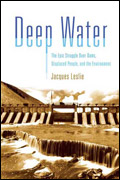Africa
-
Deep thought of the day
When tallying up the costs and benefits of climate change (and mitigating climate change), economists generally use GDP figures. If the entire continent of Africa was wiped out, that would shave about 2-4% off of global GDP. Would that count as a large cost or a small one?
-
High fashion around the globe
It's been a few months since the Ethical Fashion Show in Paris, but I had a nice chat recently with French fashion designer Annabel Gerenthon, who debuted her fair-trade shoe label Moyi Ekolo there. Annabel was the former fashion designer at Charles Jourdan before it was sold in 2003. Now she's on her own and starting shoes from scratch.
The vegetable-tanned leather used in the collection's cute ballerina flats and boots is sourced from a social project in Namibia, which she is helping supervise. "There is very little history of footwear production in Namibia, except on the workshop level," she tells me. Annabel also adorns her collections with talismans from Madagascar and Kenya. The figures, carved from horn, bone, and wood, are representative of the traditional artisan techniques of the area.
And since we are on the topic, Julie Gilhart (senior vice president over at Barney's), who also recently came back from a trip to Namibia, helped put on a stellar Future Fashion event with Earth Pledge this past Thursday with the crème de la crème of the design world. "Many of these designers have been thinking about sustainable fabrics, but didn't know where to start," she told me. "This is all about getting the influencers to do something and getting them involved in the process."
-
There’s a large human cost to subsidizing European fishing fleets in West Africa
Today's front page New York Times story -- "Europe Takes Africa's Fish, and Boatloads of Migrants Follow" -- chronicles the human cost of overfishing. Fueled by billions in government subsidies, European fleets empty out West African waters, leaving nothing for subsistence fishermen. I wrote about this in an earlier post, but it's an important enough issue to warrant reiteration.
-
Jacques Leslie’s Deep Water sheds light on dam dramas
What does hell look like to an environmentalist? In the classic Encounters With the Archdruid, writer John McPhee imagines this particular inferno. The outer ring, he writes, is a moat filled with DDT. Inside lies another moat brimming with burning gasoline, and still deeper are masses of bulldozers and chainsaws. In the middle — at […]
-
Rubber Ducky, You’re the $100
Thanks to “Sesame Street,” everybody over the age of two knows that rubber duckies make bath time lots of fun — but who knew the little yellow guys could make oceanography a bit more fun, too? Eleven years ago, a shipping container carrying 29,000 rubber bath toys (frogs, turtles, and beavers, as well as the […]
-
Raising the Zanzibar
The island of Zanzibar, located just off the coast of Tanzania, is set to get its first national park. The island, which is independently governed, plans to convert the 12,355-acre Jozani Forest Reserve into a national park to promote better conservation, management, and natural-resource use, according to Mussa Ame Silima, Zanzibar’s minister of agriculture, natural […]
-
Preaching the gospel of ecotourism
Costas Christ has a knack for handling sticky situations. I got a glimpse of this as I was making my way home from an ecotourism conference in Senegal in the early 1990s. Along with a number of other conference participants, I was stuck in the airport in the capital city of Dakar. For some unknown […]
